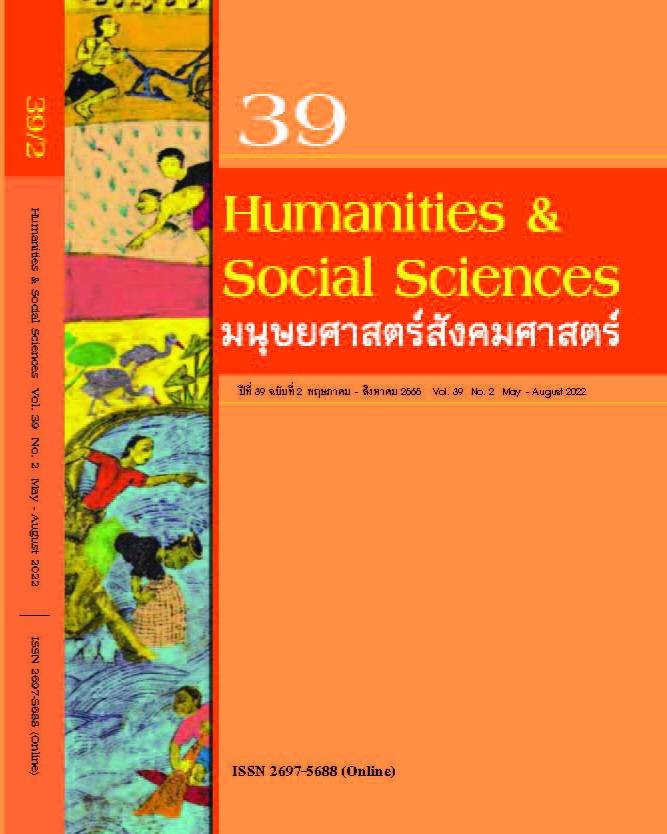พิธีกรรม “กินดอง” : บทบาทต่อชาวบ้านในชุมชนอำเภอเมืองหนองบัวลำภู จังหวัดหนองบัวลำภู
Kin Dong Ritual : Roles to People and Communities of Muang Nong Bua Lam Phu District, Nong Bua Lam Phu Province
Keywords:
พิธีกรรม “กินดอง, ชุมชนเมืองหนองบัวลำภูAbstract
Abstract
The purpose of this research article was to explore the roles of Gintong Ritual to the people and communities of Muang Nong Bua Lam Phu District, Nong Bua Lam Phu Province. The data of this research study were collected through fieldwork from June 2015 to March 2017, and then the data was analyzed by the framework of folklore.
Findings revealed that Kin Dong Ritual represented four roles to the people and communities of Muang Nong Bua Lam Phu, Nong Bua Lam Phu Province. First, the ritual boosts spirits and encouragement to people in the communities. The ritual involves the belief that the ancestors' spirits will protect their offspring in the community. Second, the ritual helps relieve their offspring's hardship, suffering, and conflicts because the ritual provides the area for sharing and discussion. Besides, people can gather in the ritual to enjoy themselves by dancing and having a good time together. Third, the ritual helps build up the network and unity of the people and the communities. They are closely related to the belief that they are offspring of the same ancestors. People respect the elderly and those who are from the same family line. Fourth, the ritual enables people and communities to create their cultural identity, specifically Muang Nong Bua Lam Phu communities, which is unique from other communities.
Keywords: Kin Dong Ritual, Muang Nong Bua Lam Phu communities
References
จารุบุตร เรืองสุวรรณ. “เรื่องฮีตสิบสอง-คองสิบสี่ ระบบการปกครองของชาวลาวและอีสาน
สมัยเก่า.” มูลมรดกชนชาติอ้ายลาว. อนุสรณ์งานพระราชทานเพลิงศพ สมเด็จพระ
ยอดแก้วพุทธชิโนรสสกลมหาสังฆปาโมกข์ สมเด็จพระสังฆราชแห่งพระราชอาณาจักร
ลาว ณ เมรุหลวงหน้าพลับพลาอิศริยาภรณ์ วัดเทพศิรินทราวาส กรุงเทพมหานคร
มีนาคม 2528.
ฑิตยา สุวรรณชฎ. แนวคิดทฤษฎีสังคม. กรุงเทพฯ : คณะพัฒนาสังคม สถาบันบัณฑิต
พัฒนบริหารศาสตร์, 2544.
ประสิทธิ์ สวาสดิ์ญาติ. ระบบเครือญาติและการจัดระเบียบสังคม. พิมพ์ครั้งที่ 2. กรุงเทพฯ :
สำนักพิมพ์จุฬาลงกรณ์มหาวิทยาลัย, 2539.
ภาณุพงศ์ อุดมศิลป์. ลัทธิพิธีการนับเจ้าแท่สองนางกับชุมชนชายฝั่งลุ่มน้ำโขง. วิทยานิพนธ์
หลักสูตรปริญญาอักษรศาสตรดุษฎีบัณฑิต สาขาภาษาไทย ภาควิชาภาษาไทย
คณะอักษรศาสตร์ จุฬาลงกรณ์มหาวิทยาลัย, 2554.
มหาดไทย, กระทรวง ศึกษาธิการ, กระทรวง และศิลปากร, กรม.วัฒนธรรม พัฒนาการ
ทางประวัติศาสตร์ เอกลักษณ์และภูมิปัญญา จังหวัดหนองบัวลำภู. กรุงเทพฯ :
คุรุสภาลาดพร้าว, 2544.
สุภางค์ จันทวานิช. ทฤษฎีสังคมวิทยา. กรุงเทพฯ : สำนักพิมพ์จุฬาลงกรณ์มหาวิทยาลัย,
องค์การบริหารส่วนจังหวัดหนองบัวลำภู. แผนพัฒนาสามปี พ.ศ.2557-2559, องค์การ
บริหารส่วนจังหวัดหนองบัวลำภู. 2558.
ภาษาอังกฤษ
DurKheim, Emile. The Elementary Form of Religious Life. Translated by
J.W.Swain Allen & Unwin, London: 1926.
Geertz, Clifford. The Interpretation Of Culture. Basic Books, Inc., publishers,
New York : 1973.
Turner, Victor W. The Ritual Process : Structure and Anti- Structure. University
of Chicago : Aldine Publishing Company, 1970.



